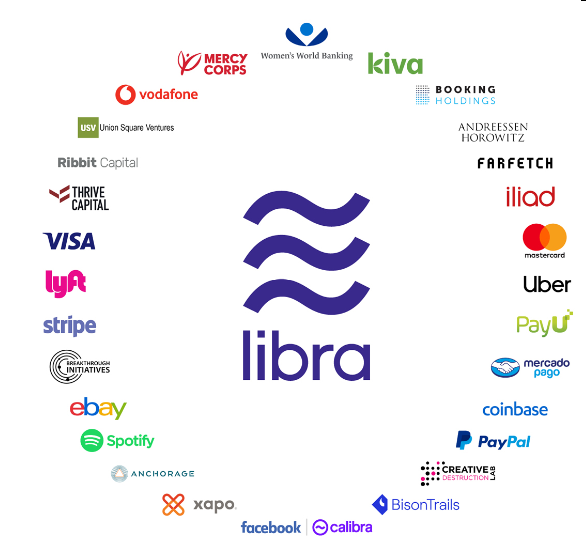Yesterday, after months of market buzz on the subject, Facebook (NASDAQ:FB) officially unveiled its latest 'product," a cryptocurrency it's calling Libra. According to the whitepaper:
“Libra’s mission is to enable a simple global currency and financial infrastructure that empowers billions of people.”
Sounds pretty lofty.
1. So, What is Libra Exactly?
Put simply, Libra is both the name of the coin and its blockchain, much like Bitcoin. The Libra blockchain will record all transfers of the coins and facilitate payments between individuals, by offering instant money transfers for low fees.
Libra's mission is broad—everything from enabling cheap international money transfers to allowing individuals without a bank account to participate in the digital economy. The coin will be pseudo-anonymous: participant identities won't be recorded on the blockchain, but since a government issued I.D will be necessary for all participants, users will be trackable if necessary by the Libra Association.
2. What’s in it for Facebook?
Facebook is hoping to reach billions of potential users who would have to register for its proprietary Calibra crypto wallet, which would be integrated on its platforms—Facebook, Messenger and WhatsApp. In this way, Facebook would be able to make Calibra the default route for user to access their funds on this blockchain. Of course, this would also enable the social media giant to market an array of new financial services and, perhaps key, collect even more user data. Data collection is, after all, an essential part of Facebook’s DNA.
Nonetheless, the company promises Calibra will have “easy-to-find privacy controls that detail what data is collected, used, and shared, and for what purposes.” As well, third-party wallets will also be usable so ostensibly, access to Libra won't be driven by a Facebook monopoly.
3. Is It the New Bitcoin?
Though both depend on cryptography principles to secure their respective blockchains, that’s about the extent of their similarities. Bitcoin is decentralized, censorship-resistant, and permissionless. Libra, at least in the beginning, will be controlled by the Libra Association.
4. What's the Libra Association?
The Libra Association is the governing body of the blockchain, each of whom has a Libra Investment Token stake (see below).

Many leading U.S businesses, including but not limited to Mastercard (NYSE:MA) and Visa (NYSE:V), Uber (NYSE:UBER) and Lyft (NASDAQ:LYFT), Coinbase, and of course, Facebook are members. Each decision concerning Libra will be brought before the group, with each founding member getting one vote. Therefore, though Facebook is the public face of the project, it doesn’t single-handedly control it.
5. What Will Get Disrupted?
Primarily any entity that deals with money transfers, including banks, Western Union (NYSE:WU), even Ripple. Blockchains are regarded as a way to cut out trusted but costly middlemen. In this case, the trust will remain a part of the equation, but Libra aims to capture the business by eliminating the overhead generated by middlemen.
6. Will It be Tradeable?
According to the white paper, exchanges will be set up to facilitate trade between local currencies and Libra, when it launches in 2020. As such, trading Libra will be a possible. However, Libra is meant to be a stablecoin, thus a global cryptocurrency backed by a real asset, in order to keep it's value steady. It will be backed by a basket of “leading currencies and government securities,” with the goal of giving each Libra coin intrinsic value, to prevent speculation and mitigate volatility.
7. How Will Libra Impact the Cryptocurrency Asset Class?
Libra is the biggest corporate endorsement of cryptocurrencies yet. While it's a far cry from the ideology and freedom of Bitcoin, it has the potential to introduce billions of potential users to the idea of value transfer via blockchain. This should therefore benefit Bitcoin as well. But nothing is guaranteed. Right now Libra is more of a blockchain-based PayPal (NASDAQ:PYPL) alternative than it is a cryptocurrency in the traditional sense.
8. What's the Libra Investment Token?
In addition to Libra itself, which will be publicly available, Facebook is launching a security token, called the Libra Investment token. Its purpose is to incentivize investment in the project, by giving owners a stake in the interest gained on the reserve assets backing Libra. Each founding member, having committed at least $10 million to the project, will receive an equivalent amount in Libra Investment Tokens.
Potentially, with a reserve of tens of billions of U.S. dollars; it could provide significant dividends for token holders. Reportedly, these tokens will only be available to accredited investors. In truth, the the Libra Investment Token remains one of the most mysterious parts of the project right now. Not much is known about it, including the launch date or availability.
Conclusion
From a technological and financial point of view, this is an exciting innovation. Not only is Facebook aiming to unify internet payment systems, it's also trying to launch a new global currency that isn't meant to defy government regulators since the value of its tokens hinges on the value of sovereign currencies.
Still, this feels as though Big Tech is now one step closer to shifting the balance of power away from government agencies. Nevertheless, Libra isn’t a done deal yet, nor a guaranteed success. It's early days for the project and Facebook will continue to figure things out.
As for the U.S government, it isn't sitting back and watching. Later yesterday the House Financial Services Committee requested that Facebook put a moratorium on development of Libra “until Congress and regulators have the opportunity to examine these issues and take action.”
